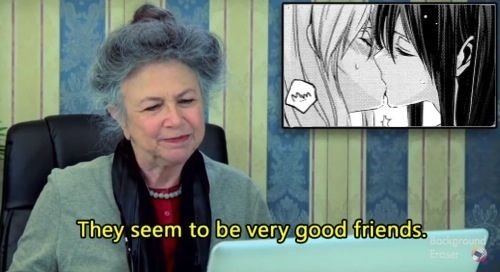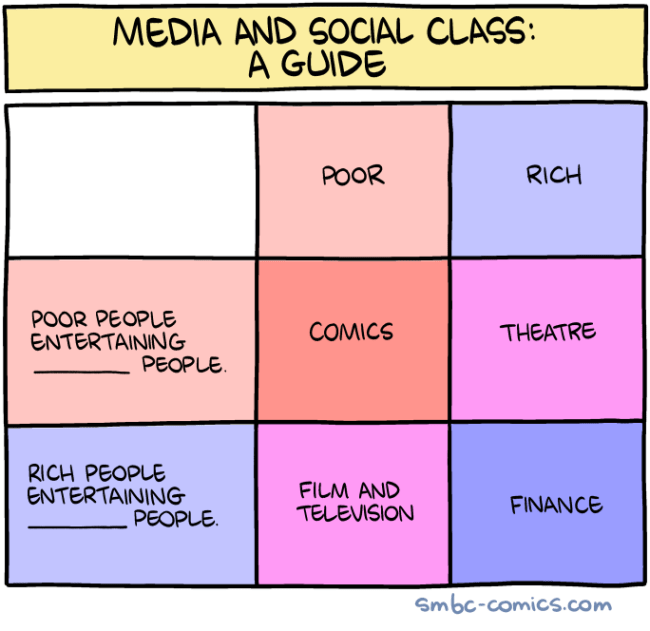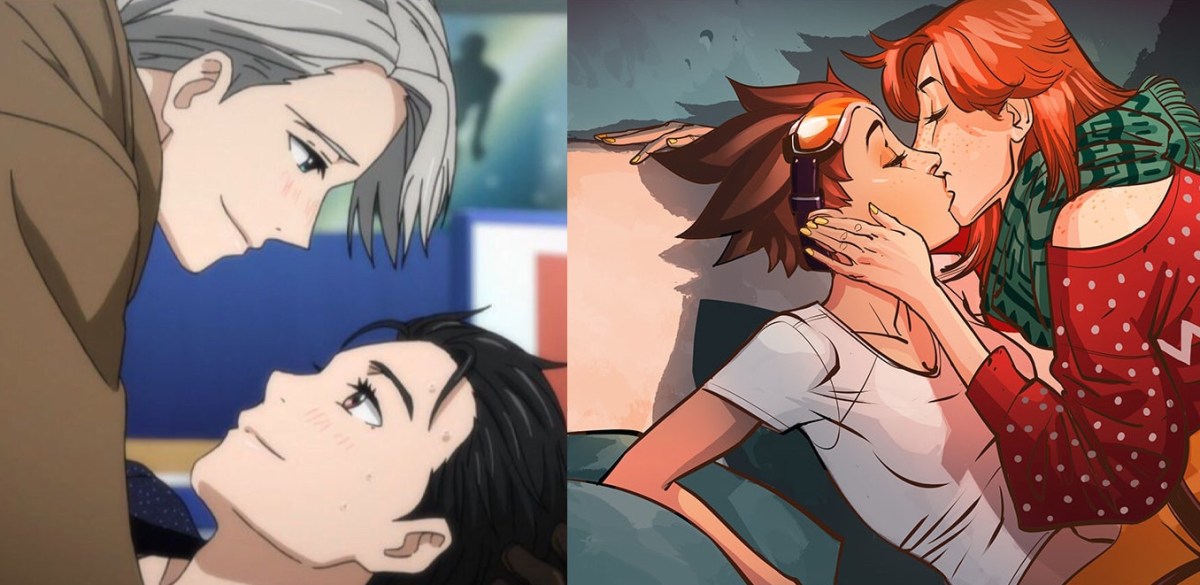We’ll never be satisfied. We want queer representation, but when we get it, it’s not good enough. We’re always looking for something to be upset about. We keep nitpicking. Even when it’s good, we complain there’s not enough of it. If they kiss, we say it’s sexualizing the characters too much, perhaps even objectifying them. If they don’t kiss, it’s queer-baiting. Why even bother including a queer romance if people will only complain about it? It’ll never be perfect, after all.
That’s a sentiment I’ve seen a lot, particularly in the past couple of months, and it’s not a sentiment that I expect to go away any time soon. If I were in a charitable mood about 2016, I might give you a platitude about how “things are getting better” and these conversations are growing pains. They are growing pains. But unfortunately, I think that 2017 will not show a marked improvement.
But let’s not talk about that yet. Let’s circle back.
Back in January of this year, a story went around about other countries, including the UK, censoring some of the content that appears in Steven Universe. Specifically, the flashback scene in which Pearl and Rose Quartz share a romantic embrace. But let us not cast stones from our glass house! Even here in the States, it’s not unusual for shows to shy away from showing an actual same-sex kiss, even if the two characters in question are canonically together. Back in 2011, Adventure Time shied away from pairing up Marceline and Princess Bubblegum, even though the show implied it heavily. Legend of Korra‘s finale, which aired in 2014, became notorious for stopping just short of giving us a kiss between the show’s heroines–in spite of the fact that the show’s follow-up comic does plan to take their romance to a more physical step.
But, you might protest, those are kids’ shows. I’d say that’s debatable, particularly when it comes to Legend of Korra–but regardless, children’s programming usually doesn’t shy away from showing casual displays of affection between heterosexual couples. Some examples off the top of my head: almost every Disney movie ends with straight people kissing, and last I checked, those movies are definitely for kids. Also, the climax of A Goofy Movie ends with a kiss between Max and Roxanne, who are dogs, but definitely straight dogs, thankyouverymuch. Clearly, kids can handle seeing a kiss or two. So long as it’s straight.
The implication that a same-sex kiss is somehow inherently graphic and sexual, and also that it’s something that requires some sort of complicated explanation that a child wouldn’t understand, is a big part of the problem. And, unfortunately, it’s a problem that also affects even the media that’s supposedly for adults. Even when a queer romance appears in a show that isn’t for kids, people still tend to see it as inherently sexual and graphic, or mentally place it in a “porn” category in their brain, simply due to the fact that societally we’ve classified these types of relationships as “adults only” content. After all, a same-sex kiss never appears on a kids show (even though opposite-sex kisses do all the time), and sometimes same-sex kissing is too graphic to include even in adult content. It’s hard not to internalize that message.
Take Yuri!!! on Ice, for example. This 12-episode anime took the internet by storm this year, capturing the hearts of viewers across the world, and even charming professional figure skaters who enjoyed the representation of the sport as seen on the show. But, if you didn’t know much about the show beyond the occasional screen-caps on Twitter, you might think that YoI isn’t for you, particularly if you aren’t interested in gay porn. So let me just go ahead and clear that misconception up for you.
YoI isn’t part of the yaoi genre; it’s not porn. There’s nothing wrong with porn, mind you. But if you start watching YoI and you’re hoping for some yaoi/BL porn, you’re going to be pretty disappointed. If anything, it’s the opposite, since it’s a relatively chaste, warm-and-fuzzy romantic story. Again–nothing wrong with that at all. It’s great. It’s just, y’know, not the genre you might think it is.
The show has earned criticism, particularly from Western viewers, due to the fact that it has actively shied away from showing physical intimacy between its lead characters. YoI doesn’t necessarily work as an example of queer-baiting, since it does show a romance unfolding between its two male leads. As the show goes on, the viewer comes to understand that they’re watching a coming-of-age (and coming-out-of-the-closet) story, and a beautifully told one at that. What’s radical about YoI is that it normalizes the idea of a queer couple getting a rom-com, will-they-won’t-they romance. It’s sad that this is a rare thing, across multiple cultures, but it’s still wonderful to see it all happen.
I’ve also seen many Western viewers blaming Japanese culture for why YoI doesn’t show as much physical intimacy as desired. However, I think it’s important for us to look back at the media that we produce in the Western world and recognize that we, too, have a long way to go when it comes to depicting queer romances, in animated TV and elsewhere. First of all, I’m not convinced a show like YoI would even come out here in America at all, let alone show a kiss. And second of all, we need only look to Legend of Korra – a show that was happy to show kisses between opposite-sex couples, but which shied away from showing us a kiss between two women — for the counterpoint on this one.
 (image via FunnyJunk)
(image via FunnyJunk)
It’s become a bit of a running gag online to shout “queer-baiting” even when a piece of media very obviously depicts a queer couple. It’s a rallying cry of shared frustration about a problem that doesn’t actually have an easy answer, because sometimes, a piece of media really doesn’t show the kind of relationship we want, but we still have to settle for it anyway. That ongoing frustration explains, at least in part, the mixed reactions and uncertainty that surrounded Blizzard’s recent reveal that Tracer, the face of their team-based multiplayer shooter Overwatch, is a lesbian.
Much like Legend of Korra plans to do with their book next year, Tracer’s first same-sex kiss unfolded on a comic book page, not as an unavoidable part of the game itself. Of course, plenty of people have seen the comic book by now, since the reveal went viral, so it’s not exactly hidden from the game’s demographic– but, it’s not like Overwatch put Tracer kissing her girlfriend on their menu splash screen. (If they want to, though, that would be fine with me. Just saying.) It’s a piece of extended universe trivia that, in theory, doesn’t affect the game. Because, really, why would it?
And therein lies the rub: it doesn’t matter, except that it also does matter, at the same time. The day that Overwatch comic came out, I read it, cried, and then spent the rest of the day shrugging and going, “Who cares?” Of course, I cared. Yet, I also didn’t care. And I felt resentful, somehow. I didn’t want a kiss in an extended-universe comic for a video game with a massive budget to be something that mattered to me as a person, because, really, who needs Blizzard’s approval? Not I, said the woman crying at her kitchen table.
It’s complicated, okay?
Anyway, as the day wore on and fans weighed in with their thoughts, I saw at least a couple of my peers floating out opinions into the ether about whether or not the kiss between Tracer and her girlfriend was somehow too sexualized. After all, they pointed out, one can’t help but notice that these two women are pale, thin, and conventionally attractive. Is showing a kiss between them just a way to cater to male fans? Never mind the fact that many male fans seem too angry about the fact that Tracer is a lesbian to be turned on by her kissing another woman.
It’s worth pointing out these problems, though—the lack of body diversity, especially for female characters, and the fact that characters who don’t look the way they’re “supposed” to look often don’t end up having romantic and happy endings. If Yuri!! on Ice were about a body-diverse bowling team rather than a group of slim, sparkly ice skaters, would it still have the same fandom? I’d like to say yes, but I realize that we’re not there yet.
However, I think it sets a concerning precedent to frame same-sex kisses as inherently sexual, or even pornographic. Like, yes, same-sex couples have sex, and that isn’t something that we should be afraid of acknowledging, nor is it something that should be seen solely as an objectified and fetishized act. But, also, same-sex couples hold hands, cuddle, and kiss in completely casual, off-the-cuff settings. Queer representation isn’t just about depicting a mega-serious, monogamous, story-for-the-ages romance that ends in marriage. It should also be about depicting a woman giving a gift to her girlfriend, and receiving a casual and happy kiss in response. And, maybe, that kiss isn’t even the narrative climax of the story in question–it’s just something that happens, along the way. We need that, too.
It is sad to me that so much media hesitates from showing a deep, passionate kiss between same-sex couples. But it’s also sad to me that we don’t even get a brief peck on the mouth, either–and that even the most casual of affectionate displays could be seen as somehow inappropriate, particularly for a child to see.
In considering this topic for the past month or so, I keep circling back mentally to this one-panel joke from Saturday Morning Breakfast Cereal. It’s about how funding for various forms of media works, and it’s simple, yet spot-on.

This is why Disney’s Bob Iger says that Rogue One isn’t a political movie, even though it is. Lucasfilm has to worry about selling Star Wars tickets to everyone in America, and there are a lot of people out there who think the Empire symbolizes liberalism. That’s also why I don’t expect Star Wars to ever canonize a relationship between Chirrut and Baze, although I do think it’s possible we’ll see that romance on a comic book page in the future. After all, relegating queer romances to comic books is all the rage! It’s far less financially risky to do that. As the SMBC comic explains, comics are “poor people entertaining poor people.” When it comes to TV or games or movies, though, there’s a way bigger budget on the line, and that means you need to come up with a message that can be interpreted as “safe.” Leave the gay stuff in the extended universe, where bigots will still get angry about it but will largely be able to pretend it doesn’t exist.
I’m not saying that I hold Blizzard games and Star Wars movies to a lower standard, or something. I still have the same high expectations for big-budget media that I do for tiny, under-funded, under-appreciated indie projects. But I’m also, obviously, not shocked when big-budget projects disappoint me. And I do realize that, for Blizzard, including one gay character in a comic book page was a big deal, for their bottom line. That was a decision that probably lasted through months of meetings and discussions about how to approach ticking off that one box. And, yes, I’m sure they did see it as ticking off a box. That’s depressing, too.
That depressing feeling doesn’t seem like something that will go away in 2017. If anything, I expect the next year of media to be bleak, particularly the big-budget properties. “Playing it safe” in Trump’s America will probably not look very compelling. Big-budget TV, movies, and video games will change. Indie art should, in theory, be the place that we look for better work—but funding for the arts, and for independent media in general, has been decreasing for years. I don’t expect that to get better in the next eight years.
Unfortunately, that doesn’t mean I’m going to stop caring. I intend to keep complaining, actually. Because I am not yet satisfied. And why should I be? What we have now is not good enough. Yes, giving up is easier than learning and improving and fighting back against institutions that would prefer not to include these stories or normalize them in society. And, yes, I do expect that media will get worse for a period of time. But, assuming our planet still exists in ten years, I think it will start getting better again.
Let’s just do what we can to make it that far.
Want more stories like this? Become a subscriber and support the site!
—The Mary Sue has a strict comment policy that forbids, but is not limited to, personal insults toward anyone, hate speech, and trolling.—
Follow The Mary Sue on Twitter, Facebook, Tumblr, Pinterest, & Google+.









Published: Dec 29, 2016 05:33 pm